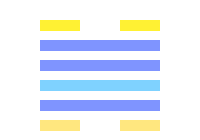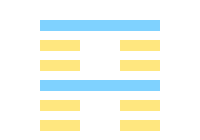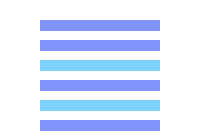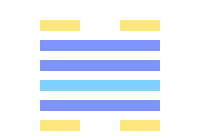28.2.4.5.6 (28 > 52)

28.2.4.5.6 (28 > 52) - THE TÂ KWO HEXAGRAM.
- 2. The second line, undivided, shows a decayed willow producing shoots, or an old husband in possession of his young wife. There will be advantage in every way.
- 4. The fourth line, undivided, shows a beam curving upwards. There will be good fortune. If (the subject of it) looks for other (help but that of line one), there will be cause for regret.
- 5. The fifth line, undivided, shows a decayed willow producing flowers, or an old wife in possession of her young husband. There will be occasion neither for blame nor for praise.
- 6. The topmost line, divided, shows its subject with extraordinary (boldness) wading through a stream, till the water hides the crown of his head. There will be evil, but no ground for blame.
28.2.4.5.6 (28 > 52) - Lending consumables
One borrows an object without any guarantee of being able to return it intact.
Bing DeepL Google Yandex28.2.4.5.6 (28 > 52) - Lending consumables
One borrows an object without any guarantee of being able to return it intact.
Bing DeepL Google Yandex28.2.4.5.6 (28 > 52) - Tá kvoh, le grand excès
Tá kvoh : 1. Grand excès, défaut, manquement ; 2. Traverser, dépasser.
- 2.
- 4. Une colonne haute et forte est bonne ; toute autre est dangereuse (opposition à ce qui précède)
- 5. Un vieux saule produisant une fleur, une vieille femme épousant un homme encore jeune, quoique non blâmables, ne peuvent être loués. La fleur du vieux saule ne peut durer, l’époux d’une vieille femme peut s’en dégoûter. (Faits qui passent les règles ordinaires.)
- 6. Traversant un fleuve, y entrer jusqu’au sommet de la tête est chose dangereuse, (mais peut n’être point blâmable, si on le fait pour aider quelqu’un, d’après le Com.) (3e sens). Force défaillante.
28.2.4.5.6 (28 > 52) - Prêter des consommables
On emprunte un objet sans garantie de pouvoir le rendre intact.
Bing DeepL Google Yandex28.2.4.5.6 (28 > 52) - Lemondás
- 2. Ha valaki nehézségekbe ütközik, emelje fel a leggyengébbet is hogy megőrizhesse jövőjét.
- 4. Mások támogatják de még fel kell épülnie.
- 5. Igyekszik javítani mielőtt mások észrevennék a hanyatlást.
- 6. Egyedül akar haladni a környezők gyengesége miatt.
The trigrams
The trigrams are combinations of three yin and yang lines. The three bottom lines of the hexagram form the lower trigram and represent the inner situation. The three top lines form the upper trigram and represent the outer situation.
Upper trigram: The lake The mountain


Lower trigram: The wind The mountain


The formation: 28
What is already there

28 - THE TÂ KWO HEXAGRAM.
Tâ Kwo suggests to us a beam that is weak. There will be advantage in moving (under its conditions) in any direction whatever ; there will be success.
Bing DeepL Google Yandex28 - Loneliness
One goes on their own if necessary. Stick to the essential.
Bing DeepL Google Yandex28 - Loneliness
One goes on their own if necessary. Stick to the essential.
Bing DeepL Google Yandex28 - Tá kvoh, le grand excès
Tá kvoh : 1. Grand excès, défaut, manquement ; 2. Traverser, dépasser.
Texte
Grandeur défectueuse. Appui faible qui, en s’affermissant en toute manière, peut devenir utile. (Un défaut peut se réparer.)
Symbolisme
Marais couvrant des arbres. Le sage, devant un pouvoir vicieux, se tient seul sans crainte et fuit le monde sans regrets.
Commentaire
Grandeur défectueuse, colonne faible dont le haut et le bas le sont aussi. La force défectueuse au milieu de gens faibles et doux peut, si elle agit en cherchant à satisfaire, s’affermir et prospérer en tout. La grandeur excessive ou défectueuse est une chose funeste.
Note. Nous avons ici une collection d’expressions proverbiales dont plusieurs se rapportent à la forme même du Koua. Celui-ci peut, en effet, à la rigueur, figurer une poutre entamée en haut et en bas, donc très défectueuse.
On voit ici une fois de plus combien ces divisions en six parties sont arbitraires. Le § 3 n’est que la répétition du texte ; les §§ 2 et 5 se confondent.

28.2 (28 > 31) - THE TÂ KWO HEXAGRAM.
The second line, undivided, shows a decayed willow producing shoots, or an old husband in possession of his young wife. There will be advantage in every way.
Bing DeepL Google Yandex28.2 (28 > 31) - Nurturing hope
When one encounters difficulties, one welcomes the weakest to secure their future.
Bing DeepL Google Yandex28.2 (28 > 31) - Nurturing hope
When one encounters difficulties, one welcomes the weakest to secure their future.
Bing DeepL Google Yandex28.2 (28 > 31) - Tá kvoh, le grand excès
Tá kvoh : 1. Grand excès, défaut, manquement ; 2. Traverser, dépasser.
- 2.
28.2 (28 > 31) - Entretenir l'espoir
Quand on rencontre des difficultés, on accueille les plus faibles pour assurer leur avenir.
Bing DeepL Google Yandex28.2 (28 > 31) - Lemondás
Ha valaki nehézségekbe ütközik, emelje fel a leggyengébbet is hogy megőrizhesse jövőjét.
Bing DeepL Google Yandex
28.4 (28 > 48) - THE TÂ KWO HEXAGRAM.
The fourth line, undivided, shows a beam curving upwards. There will be good fortune. If (the subject of it) looks for other (help but that of line one), there will be cause for regret.
Bing DeepL Google Yandex28.4 (28 > 48) - Being weakened
One is supported by others but needs to recover.
Bing DeepL Google Yandex28.4 (28 > 48) - Being weakened
One is supported by others but needs to recover.
Bing DeepL Google Yandex28.4 (28 > 48) - Tá kvoh, le grand excès
Tá kvoh : 1. Grand excès, défaut, manquement ; 2. Traverser, dépasser.
Une colonne haute et forte est bonne ; toute autre est dangereuse (opposition à ce qui précède)
Bing DeepL Google Yandex28.4 (28 > 48) - Être affaibli
On a le soutien des autres mais on a besoin de récupérer.
Bing DeepL Google Yandex
28.5 (28 > 32) - THE TÂ KWO HEXAGRAM.
The fifth line, undivided, shows a decayed willow producing flowers, or an old wife in possession of her young husband. There will be occasion neither for blame nor for praise.
Bing DeepL Google Yandex28.5 (28 > 32) - Renovating the facade
One hurries to repair before others notice the decline.
Bing DeepL Google Yandex28.5 (28 > 32) - Renovating the facade
One hurries to repair before others notice the decline.
Bing DeepL Google Yandex28.5 (28 > 32) - Tá kvoh, le grand excès
Tá kvoh : 1. Grand excès, défaut, manquement ; 2. Traverser, dépasser.
Un vieux saule produisant une fleur, une vieille femme épousant un homme encore jeune, quoique non blâmables, ne peuvent être loués. La fleur du vieux saule ne peut durer, l’époux d’une vieille femme peut s’en dégoûter. (Faits qui passent les règles ordinaires.)
Bing DeepL Google Yandex28.5 (28 > 32) - Ravaler la façade
On se dépêche de réparer avant que les autres ne constatent le déclin.
Bing DeepL Google Yandex28.5 (28 > 32) - Lemondás
Igyekszik javítani mielőtt mások észrevennék a hanyatlást.
Bing DeepL Google Yandex
28.6 (28 > 44) - THE TÂ KWO HEXAGRAM.
The topmost line, divided, shows its subject with extraordinary (boldness) wading through a stream, till the water hides the crown of his head. There will be evil, but no ground for blame.
Bing DeepL Google Yandex28.6 (28 > 44) - Losing one's bearings
One wants to continue alone because of the weakness of one's entourage.
Bing DeepL Google Yandex28.6 (28 > 44) - Losing one's bearings
One wants to continue alone because of the weakness of one's entourage.
Bing DeepL Google Yandex28.6 (28 > 44) - Tá kvoh, le grand excès
Tá kvoh : 1. Grand excès, défaut, manquement ; 2. Traverser, dépasser.
Traversant un fleuve, y entrer jusqu’au sommet de la tête est chose dangereuse, (mais peut n’être point blâmable, si on le fait pour aider quelqu’un, d’après le Com.) (3e sens). Force défaillante.
Bing DeepL Google Yandex28.6 (28 > 44) - Perdre ses repères
On veut continuer seul à cause de la faiblesse de son entourage.
Bing DeepL Google Yandex28.6 (28 > 44) - Lemondás
Egyedül akar haladni a környezők gyengesége miatt.
Bing DeepL Google YandexIn the making: 52
What is poised to happen

52 - THE KĂN HEXAGRAM.
When one's resting is like that of the back, and he loses all consciousness of self; when he walks in his courtyard, and does not see any (of the persons) in it, there will be no error.
Bing DeepL Google Yandex52 - Stop
One recognizes that it is time to stop because one needs to feed oneself.
Bing DeepL Google Yandex52 - Stop
One recognizes that it is time to stop because one needs to feed oneself.
Bing DeepL Google Yandex52 - Kán, l’arrêt
Kán : ferme, tenir droit, bien réglé, arrêter, reposer
Kan « ferme ». L’homme ferme tourne le dos et s’oppose résolument, sans tenir compte de lui-même. S’il traverse un endroit, il ne regarde pas qui y est et ne faillit point.
Texte
L’homme ferme s’oppose résolument (au mal) sans tenir compte de lui-même. Devant traverser un endroit, il ne regarde pas qui s’y trouve (mais le fait résolument) et ne faillit point.
Symbolisme
Deux montagnes superposées forment le Koua. Ainsi l’homme supérieur pense à ne pas dépasser les bornes de ses fonctions.
Commentaire
Kán signifie s’arrêter, tenir ferme, en bon ordre, agir ou s’arrêter selon l’occasion. Quand l’acte et sa cessation ont lieu en temps convenable, la conduite est belle et intelligente. « Rester à sa place », cela veut dire que les grands et les petits sont en rapport, mais sans usurpation ni entre-croisement. Celui qui est ferme et attentif à son devoir ne se recherche pas lui-même. Marchant dans son jardin, il ne voit pas même qui s’y trouve.
Note. Tout ceci illustre le sens « tenir droit, bien réglé » et se réfère aux rites du maintien extérieur qui prescrivent de se tenir toujours droit et de ne pas même s’asseoir sur un siège qui n’est pas droit.
52 - Cesser
On reconnaît qu'il est temps de s'arrêter car on a besoin de s'alimenter.
Bing DeepL Google Yandex52 - Megállás
Felismeri hogy itt az ideje megállni mert a többieket táplálni kell.
Bing DeepL Google YandexThe nuclear hexagram: 1.1.3.5.6 (1 > 40)
The nuclear hexagram is the association of the two inner trigrams (lines 2,3,4 and 3,4,5). It represents the root, or the origin of the situation.

1.1.3.5.6 (1 > 40) - THE KHIEN HEXAGRAM
- 1. In the first (or lowest) line, undivided, (we see its subject as) the dragon lying hid (in the deep). It is not the time for active doing.
- 3. In the third line, undivided, (we see its subject as) the superior man active and vigilant all the day, and in the evening still careful and apprehensive. (The position is) dangerous, but there will be no mistake.
- 5. In the fifth line, undivided, (we see its subject as) the dragon on the wing in the sky. It will be advantageous to meet with the great man.
- 6. In the sixth (or topmost) line, undivided, (we see its subject as) the dragon exceeding the proper limits. There will be occasion for repentance.
1.1.3.5.6 (1 > 40) - Waiting for the pressure to drop before completing the sharing
One asks their loved ones to be there to receive their gifts.
Bing DeepL Google Yandex1.1.3.5.6 (1 > 40) - Waiting for the pressure to drop before completing the sharing
One asks their loved ones to be there to receive their gifts.
Bing DeepL Google Yandex1.1.3.5.6 (1 > 40) - K’ien, la créativité
K’ien : principe actif, force vitale universelle.
- 1. Le dragon caché, enfoncé dans l’abîme, est sans action.
-
3. Le sage est ainsi actif et vigilant tout le jour ; le soir même, il est attentif, veillant et ne se repose pas. S’il survient un danger, une difficulté, il n’en éprouvera aucune suite fâcheuse.
Le sage rétablit toujours la voie de la justice, la foule et refoule sans cesse. -
5. Il s’élève volant dans le ciel. Le principe actif s’élève et produit dans le ciel.
Ainsi le grand homme s’élève à la hauteur de sa mission et de ses œuvres. -
6. S’il devient trop fort et dominant, il y aura lieu de le regretter.
Trop de bonne fortune ne peut durer que si l’on n’est prudent et modéré en tout.
Le principe actif doit céder au principe réceptif à certains moments ou bien les êtres ne se reproduiront pas.
1.1.3.5.6 (1 > 40) - Attendre que la pression diminue avant de terminer le partage
On demande à ses proches d'être là pour recevoir leurs présents.
Bing DeepL Google Yandex1.1.3.5.6 (1 > 40) - Fejlődés
- 1. Túl gyenge a tetthez.
- 3. Kitartó tevékenység után magára talál.
- 5. Felismeri az időszak támasztotta igényeket.
- 6. Bajba jut.
Ruler
The starting situation

28.6 (28 > 44) - THE TÂ KWO HEXAGRAM.
The topmost line, divided, shows its subject with extraordinary (boldness) wading through a stream, till the water hides the crown of his head. There will be evil, but no ground for blame.
Bing DeepL Google Yandex28.6 (28 > 44) - Losing one's bearings
One wants to continue alone because of the weakness of one's entourage.
Bing DeepL Google Yandex28.6 (28 > 44) - Losing one's bearings
One wants to continue alone because of the weakness of one's entourage.
Bing DeepL Google Yandex28.6 (28 > 44) - Tá kvoh, le grand excès
Tá kvoh : 1. Grand excès, défaut, manquement ; 2. Traverser, dépasser.
Traversant un fleuve, y entrer jusqu’au sommet de la tête est chose dangereuse, (mais peut n’être point blâmable, si on le fait pour aider quelqu’un, d’après le Com.) (3e sens). Force défaillante.
Bing DeepL Google Yandex28.6 (28 > 44) - Perdre ses repères
On veut continuer seul à cause de la faiblesse de son entourage.
Bing DeepL Google Yandex28.6 (28 > 44) - Lemondás
Egyedül akar haladni a környezők gyengesége miatt.
Bing DeepL Google YandexCorrection
The direction where the ruler is going to bend

28.2.4.5 (28 > 15) - THE TÂ KWO HEXAGRAM.
- 2. The second line, undivided, shows a decayed willow producing shoots, or an old husband in possession of his young wife. There will be advantage in every way.
- 4. The fourth line, undivided, shows a beam curving upwards. There will be good fortune. If (the subject of it) looks for other (help but that of line one), there will be cause for regret.
- 5. The fifth line, undivided, shows a decayed willow producing flowers, or an old wife in possession of her young husband. There will be occasion neither for blame nor for praise.
28.2.4.5 (28 > 15) - Admitting one's inferiority
One acclaims those who renounce competing for the sake of rectitude.
Bing DeepL Google Yandex28.2.4.5 (28 > 15) - Admitting one's inferiority
One acclaims those who renounce competing for the sake of rectitude.
Bing DeepL Google Yandex28.2.4.5 (28 > 15) - Tá kvoh, le grand excès
Tá kvoh : 1. Grand excès, défaut, manquement ; 2. Traverser, dépasser.
- 2.
- 4. Une colonne haute et forte est bonne ; toute autre est dangereuse (opposition à ce qui précède)
- 5. Un vieux saule produisant une fleur, une vieille femme épousant un homme encore jeune, quoique non blâmables, ne peuvent être loués. La fleur du vieux saule ne peut durer, l’époux d’une vieille femme peut s’en dégoûter. (Faits qui passent les règles ordinaires.)
28.2.4.5 (28 > 15) - Admettre son infériorité
On acclame ceux qui renoncent à concourir par souci de rectitude.
Bing DeepL Google Yandex28.2.4.5 (28 > 15) - Lemondás
- 2. Ha valaki nehézségekbe ütközik, emelje fel a leggyengébbet is hogy megőrizhesse jövőjét.
- 4. Mások támogatják de még fel kell épülnie.
- 5. Igyekszik javítani mielőtt mások észrevennék a hanyatlást.

